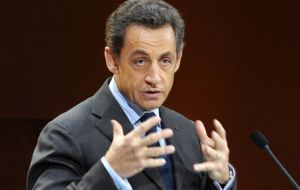MercoPress. South Atlantic News Agency
G20 meeting in China expected to address Japan, Libya and European debt crisis
 Sarkozy as rotating president of the group had proposed the meeting seven months ago
Sarkozy as rotating president of the group had proposed the meeting seven months ago China hosts Wednesday a Group 20 leaders meeting, originally scheduled to address the international monetary system, most probably criticism of the US Federal Reserve for flooding the world with money, but the latest world events, Japan, Libya and Europe’s debt crisis are bound to change the emphasis of the agenda.
China, Brazil and South Korea all slammed the Fed’s 600 billion US dollars program for driving down the dollar and fuelling asset bubbles in emerging markets, but when French President Nicholas Sarkozy, US Treasury Secretary Timothy F. Geithner, Chinese Vice-Premier Wang Qishan and European Central Bank President Jean-Claude Trichet, among others meet in Nanjing other concerns will be on the table.
The 9.0-magnitude earthquake in Japan, armed NATO intervention in Libya, and the heightened prospect of a bailout of Portugal and a possible Greek default are among developments since Sarkozy proposed the meeting seven months ago. At the same time, the Fed plans to end its Treasury purchases in June and officials have signalled that additional quantitative easing is unlikely as the US economy is showing signs of strengthening.
Officials including French Finance Minister Christine Lagarde will discuss topics including “shortcomings in the international monetary system” and dealing with volatile capital flows, according to the schedule for the conference in Nanjing.
Furthermore oil has soared over 100 US dollars a barrel and the Group of Seven nations this month triggered the biggest fall in Japan’s Yen in more than two years. A weaker currency may help Japanese exporters to weather a disaster spanning nuclear leaks and the annihilation of north-eastern towns.
Nevertheless just over a week ago, March 21, Chinese Premier Wen Jiabao told chief executives gathered on March 21 at the Great Hall of the People in Beijing that “some countries have further eased their monetary policies in order to spur economic recovery and that has caused rising global commodity prices”.




Top Comments
Disclaimer & comment rulesCommenting for this story is now closed.
If you have a Facebook account, become a fan and comment on our Facebook Page!